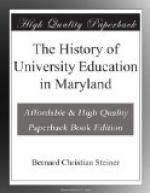THE HISTORY OF UNIVERSITY EDUCATION IN MARYLAND.
By Bernard C. Steiner.
COLONIAL ATTEMPTS TO FOUND A COLLEGE.
The State of Maryland has been almost extravagantly liberal in bestowing charters on colleges and professional schools. Over forty such charters have been given by the legislature and, in many cases, the result has proved that the gift of a charter was not warranted by the stability of the institution, to which was thus granted the power of conferring degrees. In many other cases, however, the institutions have grown and flourished, and have had an honorable history.
Collegiate education in Maryland did not begin until after the Revolution. In the colonial period there was no demand for it sufficient to warrant the establishment of a seat of higher learning. For this state of things there were several causes. The majority of the early settlers were planters and frontiersmen, having little need for an extended education and desiring it still less. Of the wealthier classes, some were like the fox-hunting English gentry, caring for little else than sport; and others, who did desire the advantages of a culture higher than that obtainable from a village schoolmaster or a private tutor, found it elsewhere. They went over to William and Mary’s College in Virginia, across the ocean to England, or, in case of some Catholics like Charles Carroll, to the institutions on the continent of Europe.
But, though no college was established in colonial times, there was no lack of plans and attempts for one. In 1671, while as yet Harvard was the only American college, there was read and passed in the Upper House of the Assembly “An Act for the founding and Erecting of a School or College within this Province for the Education of Youth in Learning and Virtue.” The Lower House amended and passed the bill; but the plan seems never to have progressed further. According to the bill the Lord Proprietor was “to Set out his Declaration of what Privileges and Immunities shall be Enjoyed by the Schollars;” and “the Tutors or School Masters” were to be of “the reformed Church of England” or, if two in number, to be “the one for the Catholick and other for the Protestants’ Children."[1]
A second collegiate plan was brought before the legislature in 1732; but, having passed the Upper House, was seemingly not acted on by the Lower. This proposed college was intended to be placed at Annapolis and was to offer instruction in “theology, law, medicine, and the higher branches of a collegiate education.” The governor of the colony was to be its chancellor and provision was made for a faculty of five, under whom students were to be instructed in everything from their alphabet upwards.[2]




